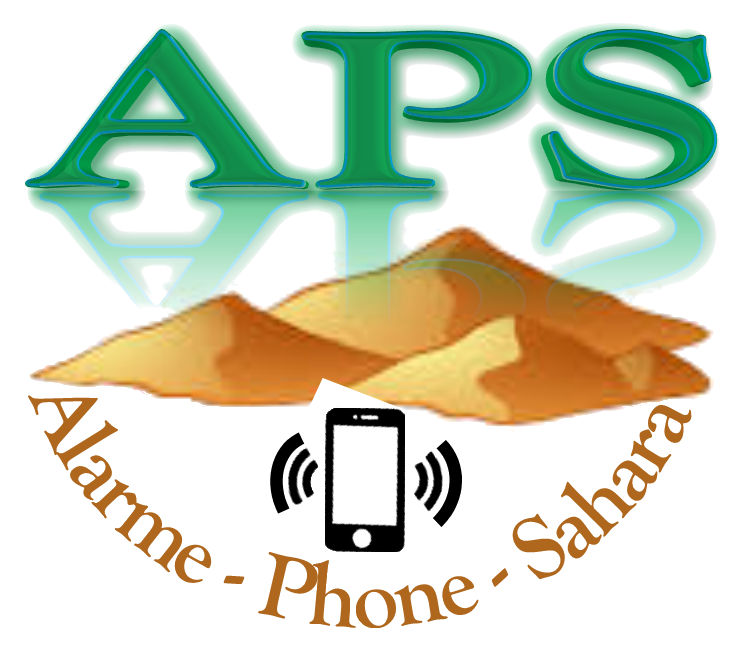With the aim of research and of improving the work of Alarme Phone Sahara on the ground, a mission took place to visit Dirkou, Bilma, Latai and Siguidine in the zone of the Kawar desert in the North of Niger. Many migrants and other travelers cross this zone on their way northwards, namely towards Libya, as well as people on their way back from Libya, and in some cases deported from there. The region is also known for its dangerous risks on the migration routes and many migrants have lost their lives and been burried in the Kawar desert.
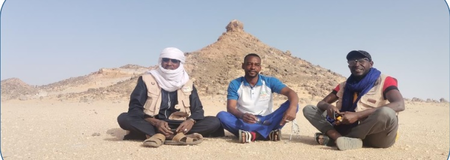
The Alarme Phone Sahara (APS) team composed of Moctar Nalosso, head of mission, Elh Maman Aboubacar, cameraman and Laouali Maouli, temporary supporter, left Agadez on Tuesday 04th of April 2022 for an 11-day mission to Dirkou, Bilma, Latai and Siguidine.
The goals of the mission are:
- To monitor the activities of the whistleblowers in the Kawar area
- To make contact with the various authorities
- To research on the deportations from Libya
- To have an overall view of the migrant's journey through the desert.
The mission left Agadez on Tuesday 04th of April at around 8pm and arrived in Dirkou on Wednesday 05th of April at around 5pm where it was welcomed by the whistleblower Laouel Taher for administrative and accommodation arrangements. The field activities are carried out according to a previously established schedule.
Thursday 06th of April 2022
Courtesy visit to the Mayor of Dirkou:
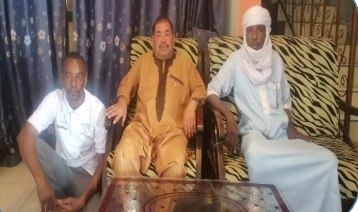
The 1st visit is directed towards the town hall of Dirkou, where the president of the communal council and the mayor Mr. Djaram Mahamata did the honour to receive the mission at his home in order to exchange on the APS network and the purpose of its presence in the commune of Dirkou. The mayor thanked the humanitarian work carried out for the migrants and guaranteed his availability for a good collaboration between APS and his community. This was an opportunity for the mayor to call on APS to extend its interventions beyond migrants, as indigenous populations have needs to which we must also pay attention.
For example, the people who have been deported from Libya are not taken into account by any organisation. Present deportations are the work of one fraction of unofficial governments of Libya, which picks up migrants and trades them with private individuals who transport them to Niger to the city of Agadez. This means that the deportees do not stay more than 4 hours in Dirkou on their way to Agadez.
During the discussions, a request was made to acquire land for APS for future humanitarian use. The mayor approved the idea and issued an administrative act granting APS a 700 m² plot of land in the communal territory of Dirkou. The land is to be used as a cemetery for Christian migrants and as an outpost for APS. At the end of about two hours of discussions, the mayor expressed his wish that APS could get involved in responding to the new migratory phenomenon of deportations from Libya.
Visit to Doctors without Borders (MSF)
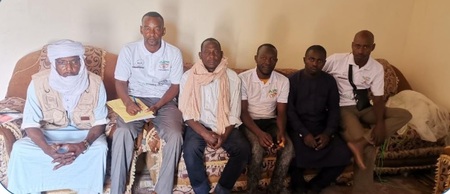
From the town hall, the mission went to the Doctors Without Borders (MSF) office in Dirkou at around 11:00 am. The meeting took place with the psychologist (acting as an intermediary), the nurse and the cultural mediator on a number of subjects, including the rescue missions and the deportations from Libya.
APS and MSF have collaborated several times in rescue missions in the Kawar area (Bilma department). MSF reiterated its commitment to this action by providing fuel and other support to the APS team for rescue missions.
With regard to the issue of deportations from Libya, MSF said it did not have enough kits to assist migrants. However, psychosocial assistance to patients is always provided.
MSF provides health assistance in the Kawar area every Wednesday from 9am to 3pm with a mobile clinic in Latai and Siguidine to treat migrants and locals and with visits every Thursday to ghettos and brothels.
Visit to Dirkou police station
In the afternoon, the mission visited the premises of the Dirkou police station to make contact with the elements on duty. The commissioner followed with interest a presentation by APS. As head of the police, he assured the mission of his organisation's commitment to collaborate with APS whenever the police are called upon. The mission took note and said goodbye to its host.
Friday 07th of April 2022
Visit to the IOM office
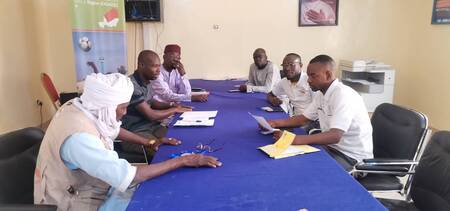
The morning of Friday 07th of April 2022 was devoted to a visit to the IOM office in Dirkou, where a group of four people, including the acting head of the sub-office and the head of SAR (Search And Rescue), organised a working session on the issue of deportations from Libya.
The various exchanges during the APS mission revealed that the latest deportations from Libya to Niger are organised by the forces of General Khalifa Haftar who is part of one fraction claiming governmental power.
Stephane Kouame, acting head of the IOM, said that his organisation has no official mandate concerning deportations from Libya, except for protection cases for vulnerable people, especially women and children. In principle, IOM is a partner of the state and not of an internationally unrecognised government such as the one operating in southern Libya. But they say it is not excluded that things will change "for the better" in the near future.
The head of SAR explained that IOM organises desert patrols together with civil protection on the migration axis (Siguidine) twice a month to assist migrants and local communities as soon as there is a verified alert, regardless of its origin. If necessary, they can organise a joint rescue mission coordinated with a local structure such as the town hall, MSF, the Nigerian Red Cross and other structures.
The issue of referrals is complicated to manage from Dirkou. The provisions do not allow migrants to be referred to the IOM for care and voluntary return except in cases of proven vulnerability (protection aspect). For the moment, this is not provided for in their charter. Only referrals of vulnerable cases who opt for voluntary return and meet the vulnerability criteria are accepted. The meeting ended at around 12.30 pm.
Visit to the gendarmerie of Dirkou
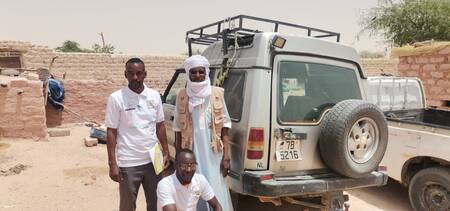
The mission visited the Dirkou gendarmerie in the afternoon to explain the purpose of its presence in the area. The brigade commander has been aware of the APS network since the discovery of a car and a body in the desert. He took the opportunity to congratulate the work of APS and to reaffirm their willingness to collaborate with APS in view of the significant results produced, as evidenced by the physical presence in the department of the car that was found by APS. The opportunity was taken to take some photos next to the vehicle. The Brigade Commander reassured that his department is in contact with the owner of the vehicle in question and that the administrative process is continuing.
Saturday 08th of April 2022 departure for Bilma
The team left Dirkou for the locality of Bilma (capital of the department) for administrative formalities, first at the prefecture of Bilma in the company of the whistleblower Laouel Taher.
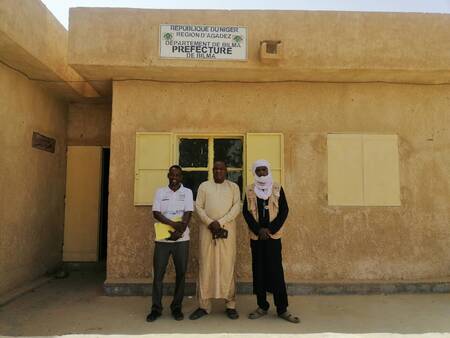
As the prefect was out of town, it was the general secretary (SG) who welcomed the mission and explained in detail the work of APS, its areas of intervention and the purpose of the mission in the Kawar area. The SG was very pleased with the visit and thanked the mission for this act. He also praised the work carried out by APS and made it clear that the three (3) objectives of APS are the most important things in this migratory zone. He appreciated objectively what APS does, especially with limited means. He proposed that for each mission to be undertaken in the Kawar area, the prefectural authorities should be kept informed. As a representative of the state, they could inform the military carrying out their regalian mission with the presence of APS in the area for security reasons. The SG strongly hopes that APS will collaborate with the administrative authorities because, to his knowledge, apart from the IOM, no structure has visited them so far. He hopes with this visit that the collaboration with APS will be perpetuated.
Visit to the Bilma court
The Bilma court served as the next stop for the team which is expected by the whistleblower Attoumane Boukar who is at the same time working in this service. The meeting with the president of the court of Bilma, Mr. Ibrahim Hamidou Karami, is magnified by the expression of his joy to see a humanitarian organisation come to his office the first time since he is in office. And he finds it very logical that APS collaborates with the justice system because many migrants have been incarcerated in Bilma prison for various reasons. He promises to make a list of the migrants who are currently detained in Bilma prison in order to have an overview of their various origins. The case of a female migrant sex worker named MP from Kaduna in Nigeria who is divorced and has a child was even mentioned. She had a dispute with a Nigerien soldier who seriously injured her, following which she filed a complaint with the courts on 2nd of March 2022. After the hearing, the court ruled in her favour and the soldier had to pay a fine of 500,000 CFA francs to compensate Mrs MP. An appointment was made for 5th of March 2022 in order to put her in her rights. On the day of her appointment in Bilma, Mrs. MP died between Djado and Siguidine while accompanied by one of her acquaintances. She was buried by her friend and the driver in the desert before informing the judge who in turn sent a team to visit the grave and carry out an autopsy on the body which revealed that the death of the deceased MP was natural. However, the judge asked APS to start efforts to try to find the family of the deceased in Nigeria. The 90 minutes or so of exchanges laid a good foundation for collaboration between APS and the judicial service in Bilma.
Visit to the Bilma town hall
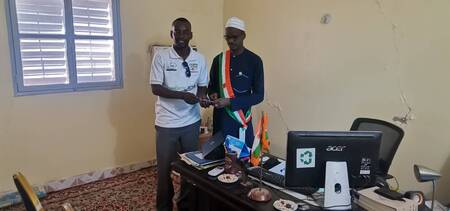
At around 3pm the mission went to the Bilma Town Hall where the Mayor welcomed them. This local authority claims to know APS through Laouel Taher and Attoumane Boukar. The mayor encouraged APS to work in accordance with its principles and promised to keep in touch with the whistleblowers in Bilma while assuring his availability to APS.
Visit to the village chief of Bilma.
A courtesy visit is paid to the village chief who made it clear that he will be willing to assist the network in carrying out its mission in the Kawar area.
Return to Dirkou
The team left Bilma at around 5pm for Dirkou where they spent the night in preparation for travelling to Latai and Siguidine the following day.
Sunday 09th of April 2022 departure to Latai
Early in the morning, the mission headed for the locality of Latai, 45 km from Dirkou, where the whistleblower Abba Kéké was waiting. After a brief exchange with him, the mission went to a place located 2 km north-east of Latai in the valley known as "Doumba". This is a place where drivers hide migrants in order to avoid harassment by the defence and security forces (FDS) positioned in Latai.
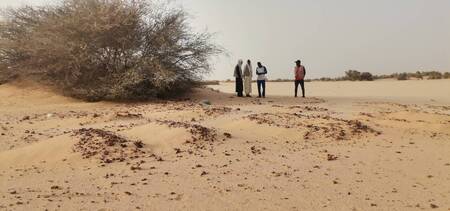
Migrants' graves in the zone of Latai, North of Niger
There were a total of eight (8) migrant graves in this area. According to Abba Kéké, six of the dead were men and the other two were women. The team took the opportunity to rehabilitate these graves with stones so that they are visible. The GPS coordinates taken at the site will make it easy to identify them in the future.
Migrants' cemetary at Latai, Niger. Migrants of Nigerien origin are burried here who died
when crossing the desert in 2019 and 2022. May they rest in peace.
A little further on was a very discreet place. Various objects found prove that travellers frequently stay in this obscure place. It is a hiding place used by transporters to avoid exposing migrants to the SDF who track down would-be migrants. It is a place where migrants suffer many kinds of violations of their rights.
Within the radius of this hideout there is also a well where migrants get water.
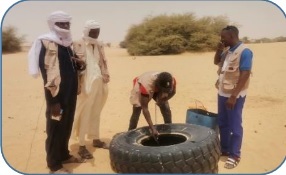
Well at Doumba near Latai, used by migrants
but dangerous due to bad quality of water
This well, far from being hygienic, has the infamous reputation of being a deadly trap for migrants, as in the case of two migrants (a man and a woman) who died after having consumed large quantities of water from this well as a result of dehydration following a breakdown. Their bodies are buried not far from those in the "Doumba" valley. The water from this well has the bad reputation of being harmful to migrants.
Visit at the well ofDoumba near Latai used by migrants but dangerous due to bad quality of water
The "Well of Hope" axis is a place of great danger. The migrants are subject to the law of the transporters who travel in convoys of 3 or 4 drivers. All the villages and checkpoints are bypassed. The crossings are strewn with pitfalls such as deaths because of passengers falling out of vehicles, passengers disappearing, etc.
Monday 15 April 2022 trip to Siguidine
Early on Monday the mission set off for Latai-Siguidine, a distance of 146 km, to meet Elhadj Sidi Malan who facilitated the administrative formalities for the mission.
Hundreds of Nigerien and Nigerian migrants leaving and returning from Libya agreed to discuss their travel situation and the deportations. Speakers of the "Hausa" language from Niger or Nigeria do not have any major worries with regard to Niger's law 036-2015. They make their crossing without being worried on Niger territory and in Libya. It is the other sub-Saharan Africans who suffer from this measure.
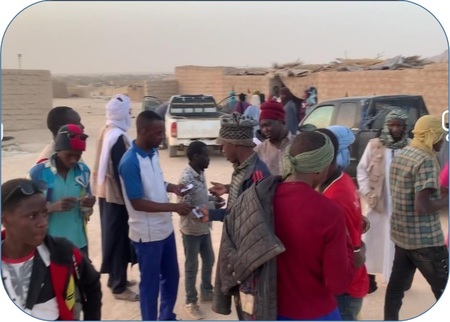
Migrants' crossing point at Siguidine, North of Niger
For example, several vehicles loaded with passengers had left for Libya in front of the authorities and on the main road without being questioned. It has been reported that it is because of the elections in Libya that the self-proclaimed "government" of General Khalifa Haftar, which is parts of one fraction claiming governmental power in Libya, is deporting all foreigners from Niger, Mali, Chad, Sudan, etc., with a view to repatriating them to their countries of origin to prevent electoral fraud during the forthcoming general elections to be held in Libya. The general prejudice is that foreigners are in favour of the relatives of the former Libyan leader Muammar El Gaddafi. As a result, there are suspicions that Nigerians, Sudanese, Malians and Chadians may be participating in the elections by giving them voter cards. Deportees are arrested all over Libya. They are rounded up in Sabha either in prisons or in fenced-off areas and loaded onto trucks carrying goods to Agadez.
A courtesy visit took the mission to the village chief. He was delighted with the visit and especially praised the courage to undertake these kinds of activities. The opportunity was taken to ask this moral authority to organise exchanges with community leaders to convey the message of APS.
Meeting with the village chief and drivers:
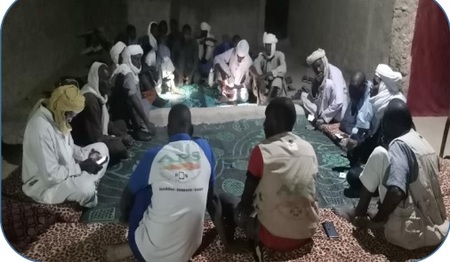
It was in the courtyard of the village chief where a crowd of 20 drivers, some community leaders and the village chief himself were willing to exchange with the mission. After the host's words of welcome, mission leader Nalosso Moctar took the floor to thank for the hospitality and to introduce APS in terms of objectives, areas of intervention, activities and the purpose of the mission in Siguidine. Laouel Taher translated for those who do not speak French. It emerged from these interviews that if the local populations are reluctant to collaborate with other humanitarian actors, it is because there is a crisis of confidence in them, as they denounce them to the authorities who question them about their involvement in migration activities. They were also informed that APS, Afrique-Europe Interact (AEI), Alarmphone Watch the Med (AP) and other partners with whom the network works have a clear position on law 036-2015. All these structures mentioned work for the free movement of people and wish to collaborate with the actors in the field within the framework of this logic. This was an opportunity to share APS business cards with a view to finding out about the existence of a freephone number to contact in case of distress in the desert.
The village chief reassured the participants that they would work together. Then it was the turn of the participants to speak along the same lines as the village chief. Even more interesting was the growing demand for PSA business cards to be distributed to users of the migration routes through the desert towards the Libyan border. With a feeling of having won a bet, the meeting ended late at night.
Tuesday 12th of April 2022, return to Dirkou
On 12th of April 2022, the mission left Siguidine and headed for Dirkou via Latai, where a very short meeting took place with the whistleblower Abba Kéké. Back in Dirkou, the mission took the opportunity to arrange visits to brothels, places where migrant women work as sex workers. The aim is to sensitise this social stratum on the challenges related to migration as a whole and on physical health.
Wednesday 13th of April 2022.
Visit to the brothels
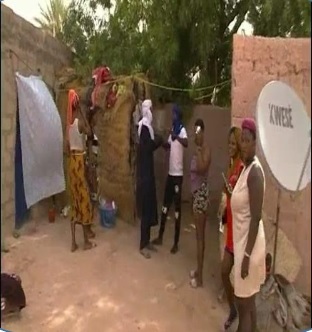
A visit to migrant women working as sex workers
under sever hardship to save money to continue their journey
The visit to the brothels was a learning experience. It allowed us to learn about the difficulties faced by migrant women. Amongst other things, it emerged that the lives of these women and girls are subjected to severe hardship, such as discrimination for several reasons. This is one of the reasons why most of the women (2000) prefer to live in transit in Djado where they save money to continue their journey to Libya after a while. Humanitarian organisations such as MSF and the Niger Red Cross used to provide them with health support. But for some time now only MSF has been organising meeting sessions with this group every Thursday.
An APS office in Dirkou
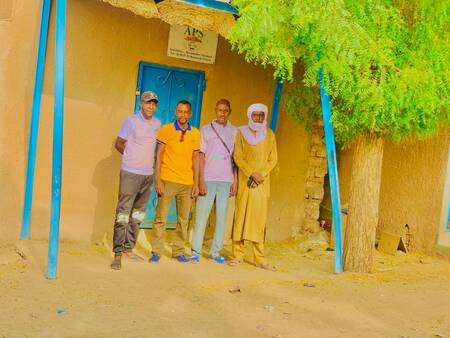
The mission took advantage of its stay to move forward in the search for visibility for the network in Dirkou, which is a crossroads. Thus, a room near the market was selected to serve as the local APS office, the rental and electricity and water charges for which are scheduled to take effect from 1st of May 2022. The premises to be used as an office are well positioned. It is already marked with an APS visibility plaque.
Thursday 14 April 2022, departure for Agadez
Leaving Dirkou in the afternoon under the escort of an army mission, the "Well of Hope" served as a stopover point for the whole night. Anything that could be used to support the visibility of APS was used there to engrave the message: "In case of distress in the desert, call APS free of charge at +227 89983339".
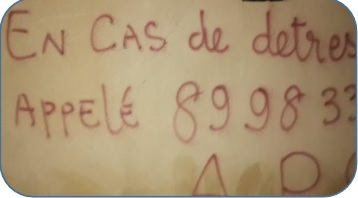
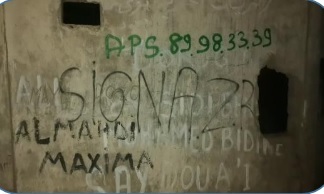
Alarme Phone Sahara leaving messages with the APS number...
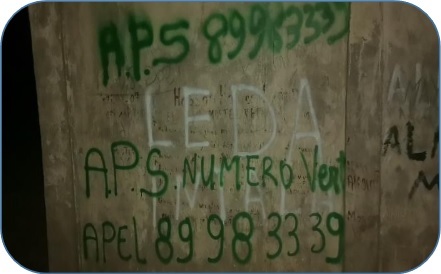
...at the "Well of Hope" in the Kawar desert.
The mission returned to Agadez on the afternoon of Friday 15th of April 2022 to the great satisfaction of all the members of the network, who are following its movement very closely because of the many obstacles the mission might face during its journey.
Annex
Cases of deaths reported by whistleblowers:
⦁ 19 deaths in Latai (longitude 12.86933 and latitude 19.38019): 8 migrants and 11 Nigerien migrants
⦁ 30 deaths at Achigour well (Longitude 11.72832 latitude 19.02693) 459 km from Agadez.
⦁ 10 deaths at the "Well of Hope" located 355km from Agadez (longitude 10.8377 latitude 18.61181)
⦁ 29 deaths at 110km from Dirkou south of Achigour
⦁ 1 case of death 7 km from Achigour of a Nigerian man named Okochukwu
Rescue cases reported by whistleblowers:
⦁ 50 people rescued by APS all from Niger going from N'guigmi to Djado with MSF fuel support.
⦁ 30 people were rescued after a vehicle accident at the "Well of Hope" and one is transported to the CSI of Anèye, a small village, with MSF support of kits and fuel.
NB: Doctors without Borders (MSF) supported with 800 litres of fuel during the APS patrols.
Deportations from Libya
- From 2021 to 2022, Libya returned 2,054 people to Niger, including 264 minors and 34 handicaped people. Among them are 17 Gambians, 13 Burkinabè, 05 Malians, 4 Senegalese, 6 Ghanaians and 1 Guinean.
- Contact with the police and gendarmerie now allows Bilma's whistleblowers to collect figures on deportations from Libya.
- Migrants are transported in "ACTROS" trucks to Agadez by private transporters.
- The transporters are solely responsible for these migrants during the way to Agadez.
- IOM has a transit centre in Dirkou (longitude 12.89341 and latitude 18.99383).
- Deportations from Libya seem to be less violent than those from Algeria.
- IOM's rescue of 25 people in April 2022 has been the subject of controversy according to some sources.
